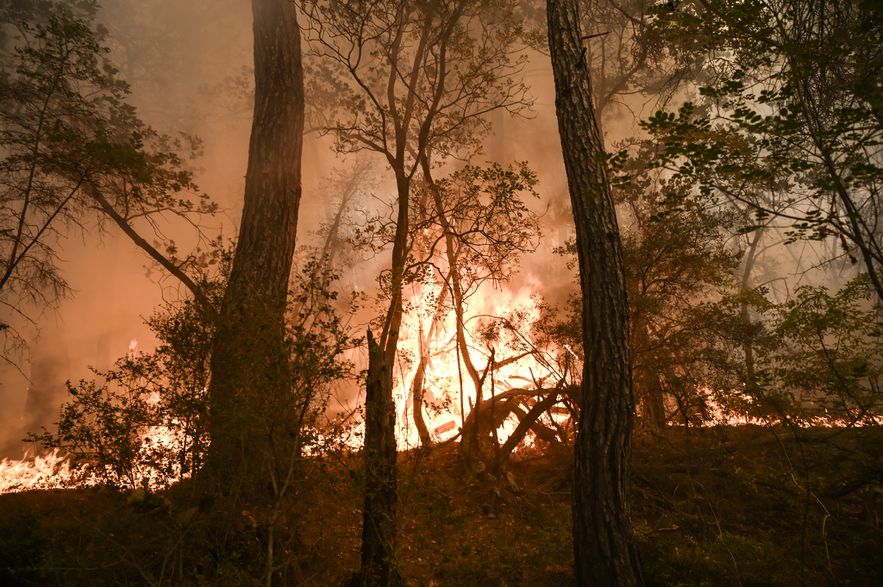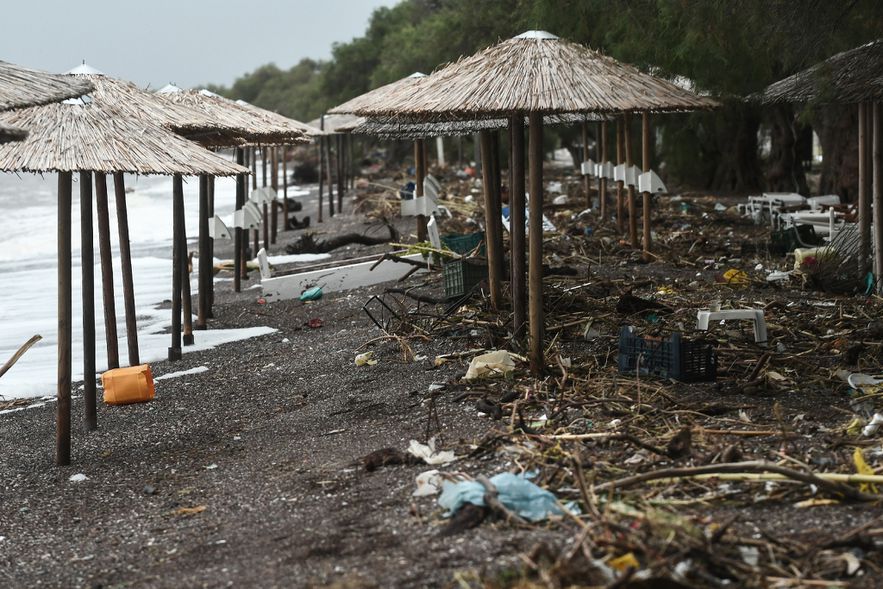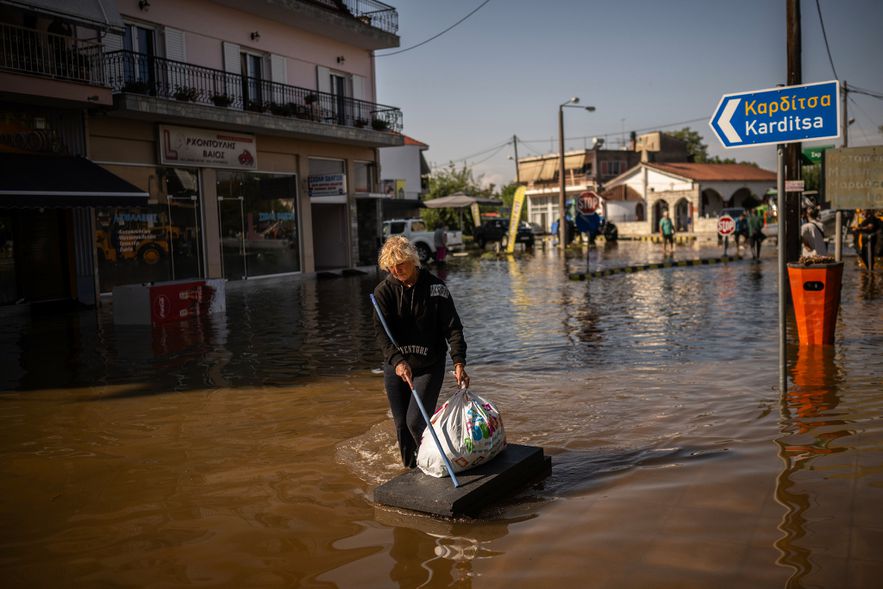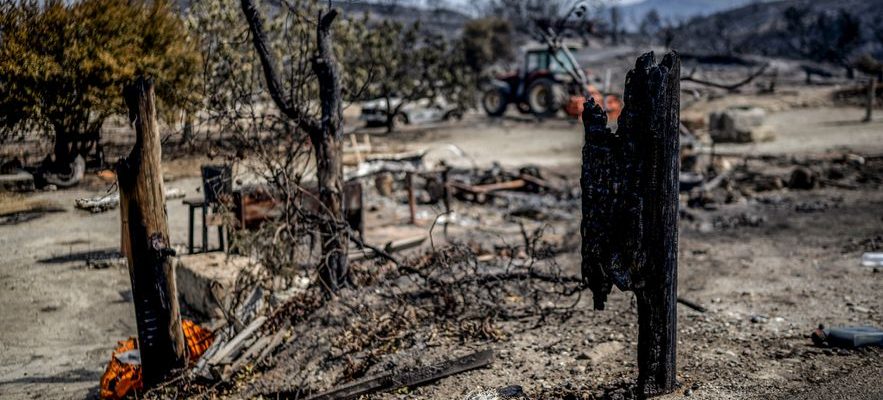The consequences of storm Daniel continue to hit Greece. This Sunday, September 10, the toll from the floods which ravaged the region of Thessaly, in the center of the country, increased further: 14 people died following the torrential rains at the start of the week, according to firefighters.
Rescue operations continue unabated, while five people remain missing according to civil protection. This new extreme weather phenomenon has hit a nation already affected by several devastating forest fires from July to September. A look back at a catastrophic summer.
The largest forest fire since 2008
The Greeks’ setbacks began in mid-July. On the 17th, several fires broke out in part of Attica, the region surrounding Athens. Very high temperatures combined with strong winds sometimes reaching 60 kilometers per hour favor the start of fires and their spread.
A farm after fires near the Greek village of Gennadi, in the south of the island of Rhodes, July 27, 2023
© / afp.com/Angelos Tzortzinis
Some time later, it was the turn of the Greek islands to be ravaged by flames. There was the large island of Euboea, near Athens, but also the small, very touristy islands of Corfu and Rhodes. It is from the latter that some 30,000 tourists and residents will be evacuated as part of an unprecedented and highly publicized operation.
However, the worst is yet to come on continental Greece. On Saturday August 19, a huge fire broke out in Dadia National Park, in the far east of the country. As the flames advance, more than 91,000 hectares of this Natura 2000 protected area go up in smoke, almost half of the area affected by fires since the start of summer.
Quickly categorized as the largest single forest fire since 2008, according to the European Copernicus Observatory (EMS), the fire will last more than two weeks, until the beginning of September.

A forest fire in Dadia National Park, near Alexandroupoli, on September 2, 2023 in northern Greece
© / afp.com/Sakis MITROLIDIS
A disaster on the border with Turkey which endangered a usual crossing point for refugees: three days after the start of the fire, 25 of them were found charred in the national park. In total, 150,000 hectares of biodiversity and 26 people have disappeared.
All the autumn rain fell in two days
We did not have to wait more than two days for a new climatic disaster to hit the country. While the flames in Dadia Park were still alive the previous Saturday, storm “Daniel” hit the central region of Magnesia on Monday September 4 and Tuesday September 5.

A beach invaded by debris and waste after heavy rains in Nea Agxialos, near Volos, central Greece, September 7, 2023
© / afp.com/Sakis Mitrolidis
Torrential rains fell on the port city of Volos and the villages of Mount Pelion, before reaching localities around Karditsa and Trikala on Wednesday. Within hours, rivers overflowed and new lakes formed, flooding homes and forcing residents to evacuate. In total, “4,250 people were rescued and brought to safety” between Tuesday and Sunday, Greek firefighters said in a press release.
In this essential agricultural region for Greece, thousands of hectares of crops have also been destroyed and many livestock have perished. The Pelion region is also affected by power and water cuts, with much of the supply network having been destroyed during the storm. “The water is not drinkable,” recalled the Greek Ministry of Health, referring to cases of gastroenteritis.

A woman carries her belongings to the flooded Greek village of Palamas, near Karditsa (center), September 8, 2023
© / afp.com/Angelos Tzortzinis
It is the phenomenon “the most extreme in terms of the quantity of water falling in the space of 24 hours since Greece has had archives on the subject”, estimated the Minister of Civil Protection, Vassilis Kikilias. And for good reason: according to meteorologist Panayotis Giannopoulos, the precipitation represents “all of the usual rain throughout the fall.”
Better adapt to the consequences of global warming
These extreme events do not only concern Greece: neighboring countries, Turkey and Bulgaria have also suffered torrential rains in recent days, costing the lives of 12 people. The phenomenon is even tending to generalize on a planetary scale: because of global warming, the atmosphere contains more water vapour, increasing the risk of episodes of heavy precipitation.
This is also the case for record fires. A study published at the end of August by the Californian Breakthrough Institute thus reveals that the rise in temperatures caused by humans has increased the frequency of “extreme forest fires” by 25% on average, compared to the pre-industrial era.
However, global warming “cannot be used as a justification” for the disasters of this summer, according to Greek academic Alexandros Dimatrakopoulos, a fire specialist. If Greece is particularly affected on the continent, this only makes more visible, according to him, the lack of adaptation of the State in the face of these extreme phenomena. This expert calls in particular for “better planning in the fight against fires” and “better cooperation between firefighters and specialists […] wooded areas”.
Failures in the prevention of these phenomena which are also found in the record floods of this week. Aged 54, a resident of the flooded village of Palamas told AFP that “the message of 112 to evacuate arrived even though we were facing the flood and we had no way to escape”.
